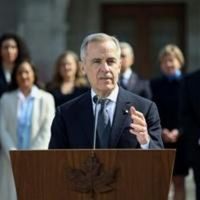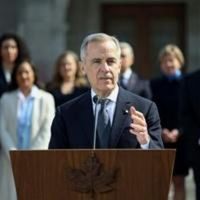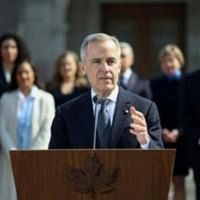New Canadian Prime Minister Mark Carney is gearing up to call a snap election for April 28, 2025, following his recent ascension to leadership, which has raised expectations for an intense campaign focused primarily on the impacts of President Donald Trump's trade war and his controversial demands to essentially convert Canada into the 51st state of the United States.
Carney, who took office just last week on March 14, 2025, following the resignation of Justin Trudeau amid internal party turmoil and external pressures, is expected to officially announce the election date this coming Sunday, March 23, 2025, according to multiple government sources. The urgency surrounding the election call reflects Carney's strategy to seize the moment following a wave of supportive polling for his Liberal Party — a party that appeared on the brink of collapse at the beginning of the year.
The Liberal Party's recent rise in polls can be attributed largely to the fallout from Trump's trade policies, which have sparked both public concern and political rallying around Carney. The situation flip-flopped dramatically since the onset of Trump’s presidency when Canadian Liberals were anticipated to face a significant defeat. Now, residents are increasingly rallying behind Carney as he prepares to counteract what many perceive as an existential threat to Canadian sovereignty.
At the beginning of 2025, as previously mentioned, the Liberals were projected to suffer a crippling electoral defeat, with the opposition Conservatives, led by Pierre Poilievre, poised to take over the government. However, increasing pressure from Trump and his aggressive rhetoric regarding Canadian autonomy prompted Trudeau's unexpected departure, paving the way for Carney.
Following his appointment, Carney wasted no time in asserting Canada's need to strengthen ties with European allies. His trips to Paris and London shortly after taking office featured calls for diversifying Canada’s trade relationships, as he stated, "What is clear is that our trade and our security relations are too reliant on the United States. We must diversify." This sentiment resonates strongly with voters wary of Trump's unpredictable policies.
The impending election is seen as an opportunity for Carney to leverage his experiences dealing with crises as a former central banker. His tenure during the financial crisis of 2008-2009, and his leadership through the tumult of Brexit, are touted as qualifications that make him suitable to navigate Canada through its current economic uncertainties.
As the election approaches, there is a sense of apprehension among political commentators regarding Carney's lack of campaigning experience. Queen's University politics professor Stephanie Chouinard remarked, "The election call was expected, with the Liberals making gains, but there is still uncertainty around Mark Carney, who has never campaigned. It's going to be a test in difficult conditions for him." Indeed, many Canadians are searching for a leader with a steady hand during these trying times, particularly as the economic conditions triggered by the trade war loom overhead.
The political atmosphere in Canada has been further complicated by the rise of conservative sentiments, exacerbated by support from figures like Elon Musk, who has openly applauded Poilievre. The term "Maple Syrup MAGA" has emerged among some Liberal circles as they attempt to frame the Conservative leader’s strong affiliation with Trump as potentially damaging to Canadian values.
Despite Poilievre's aim to position himself as an independent leader apart from Trump's influence, Trump commented on the Canadian Conservative, stating, "stupidly no friend of mine" which hints at the complicated nature of Canadian-American relations during this election cycle.
As candidates ramp up for this high-stakes race, recent polling indicates that the electorate could be closely divided, with Liberal support gradually recovering at the expense of more left-leaning parties like the New Democrats. This dynamic keeps the election unpredictable and suggests that traditional voting patterns may be evolving. University of Ottawa politics professor Genevieve Tellier noted that Canadians are not just looking for a leader who appeals electorally but one who can offer a sense of stability amid global uncertainty.
Ultimately, the snap election called by Carney not only highlights the immediate reactions to external pressures from the United States but also serves as a test of his leadership abilities and strategic vision for Canada's future. As Canada finds itself at the crossroads of domestic challenges and international relations, the forthcoming election will determine the direction the nation will take amidst these tensions, with Carney's experience and promises serving as the cornerstone of his campaign.



